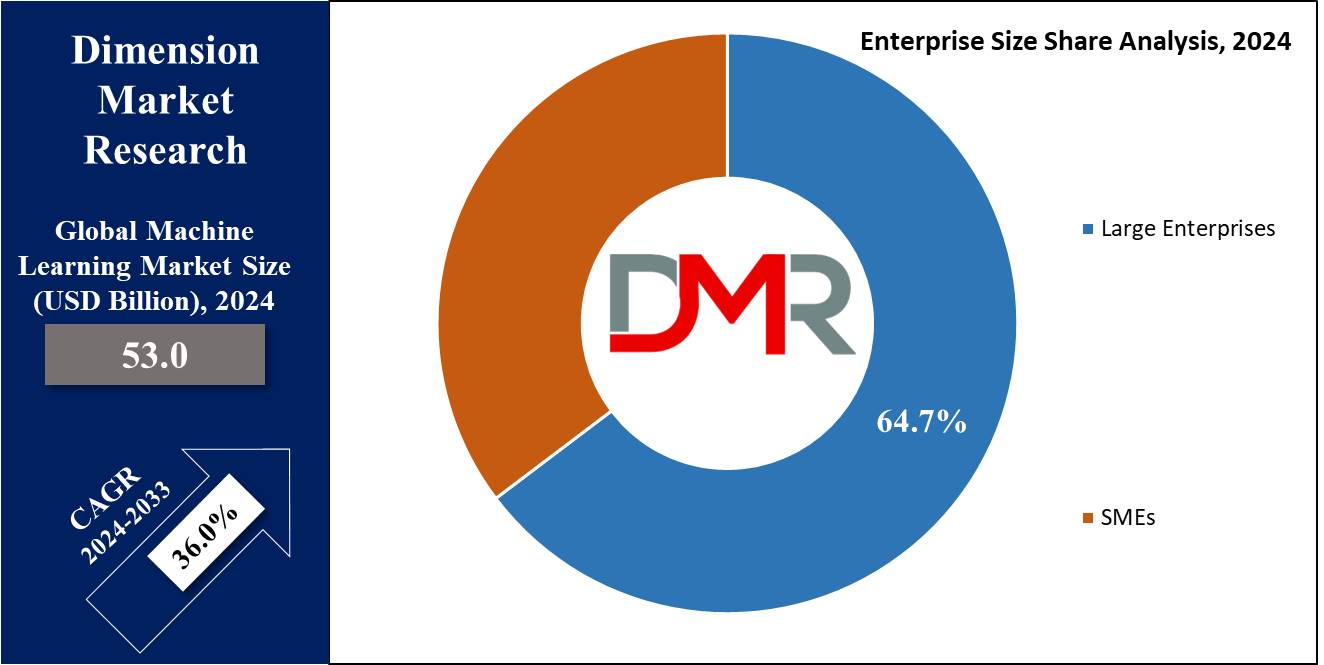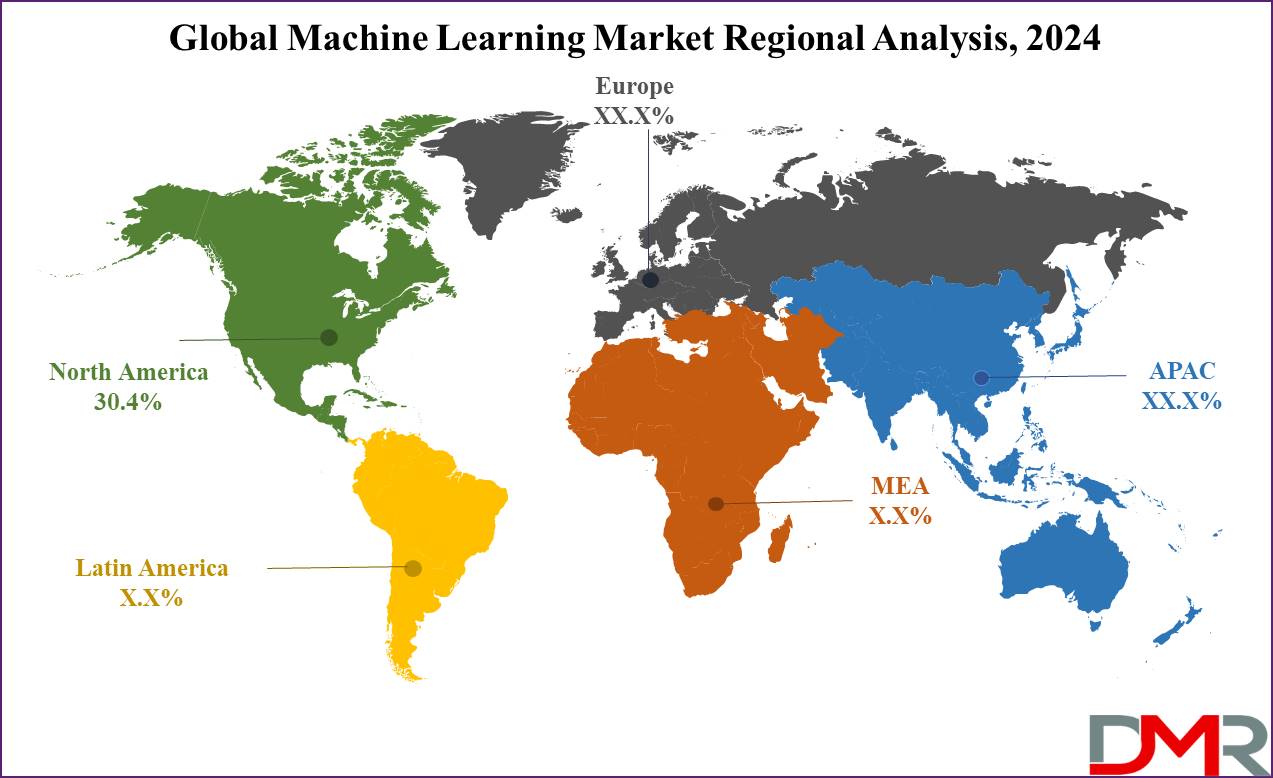As per the Truelist, the Machine Learning market is witnessing significant growth, with 80% of machine learning companies targeting e-commerce and retail sectors to drive business efficiency. TensorFlow leads the field, with 59% of professionals preferring it as their primary platform. Adoption of machine learning is delivering measurable impact; for example, Nissan achieved a 67% increase in conversion rates by leveraging machine learning models.
However, the effectiveness of machine learning algorithms largely depends on the quality & authenticity of the data provided. Concerns grow in terms of data authenticity, as information collected from surveys & other sources may contain inaccuracies. Such irregularities can lead to uneven results and hinder the performance of machine learning models. In addition, improper or imbalanced data can impede program operations, creating challenges to the growth of the machine-learning market.
Research Scope and Analysis
By Component
The machine learning market by component is segmented into hardware, software, and services, with the services segment expected to lead in 2024. Also, the hardware segment is expected to witness the highest growth during the forecast period, which is due growing adoption of machine learning-optimized hardware, mainly in the development of specialized silicon processors integrating AI & ML capabilities. Also, companies like SambaNova Systems are driving hardware adoption by introducing processing devices with better power, contributing to industry expansion.

Further, the software segment is projected to hold a moderate market share in the coming years. The rise in cloud-based applications, supported by better cloud infrastructure & hosting features, is expected to drive software usage. Cloud-based software provides flexibility, allowing smooth transitions from machine learning to deep learning applications. Moreover, there's an increase in demand for machine learning services, as managed services enable customers to effectively manage their ML tools & inspect through several dependency stacks.
By Deployment
The cloud-based segment is expected to lead the market in 2024 and is also anticipated to maintain its dominance in the market throughout the forecasted period, which is primarily driven by the broad availability of cloud computing, which greatly supports access to machine learning technologies. The growing adoption of cloud-based machine learning solutions across many organizations is driven by the strong services and high computational storage necessary for training algorithms. Cloud computing in the field of machine learning seeks to streamline operations within firms, providing low cost and flexibility.
Further enterprises use cloud computing to support machine learning training algorithms & accessing artificial intelligence services. While installing machine learning creates challenges like scarcity of specialized talent and high costs associated with infrastructure and development, cloud computing reduces these burdens by lowering expenses and technical complexities. By reducing these hurdles, cloud computing plays an important role in supporting machine learning adoption within organizations.
By Enterprise Size
The market categorizes enterprises into Small and Medium Enterprises (SMEs) and large enterprises. Large enterprises are expected to dominate the Machine Learning market in 2024, commanding a significant revenue share. Large businesses highly depend on cloud-based machine learning platforms like Google Cloud AI Platform, Amazon Web Services (AWS), & Microsoft Azure Machine Learning. These platforms provide scalable infrastructure, allowing large enterprises to adopt machine learning without high investments.
Further, the adoption of machine learning is growing among SMEs. Despite resource constraints, SMEs are adopting machine learning platforms to automate data analysis processes. These tools use SMEs to extract valuable insights from their data efficiently. By automating data analysis, SMEs can improve many parts of their operations, like understanding consumer behavior, enhancing inventory management, optimizing marketing strategies, & making informed, data-driven decisions.
By End User
The advertising & media sector is expected to lead the market in 2024, commanding a significant revenue share. Hyper-personalization comes as an important trend, with machine learning algorithms switching through large user data to craft highly personalized adverts, improving engagement and conversion rates. Another major trend is cross-channel optimization, where machine learning algorithms strategically allocate budgets & adjust bidding strategies to optimize advertising efforts across many platforms.
Moreover, there's an increase in focus on using machine learning for ad fraud detection. Advertisers are highly using these algorithms to detect & prevent fraudulent activities like click & impression fraud, ensuring the effectiveness of ad campaigns while safeguarding budgets.
Further, the legal segment is projected to experience major growth during the forecast period. Machine learning is transforming how legal professionals operate by changing task management, information processing, and decision-making processes. Predictive analytics acts as a prominent trend, allowing machine learning algorithms to look into large legal datasets, predict case outcomes, assess risks, and support legal strategies, which enhances efficiency in case management, driving growth within the legal segment.
The Machine Learning Market Report is segmented on the basis of the following
By Component
- Hardware
- Software
- Service
By Deployment
By Enterprise Size
By End User
- Advertising & Media
- BFSI
- Healthcare
- Retail
- Automotive & Transportation
- Manufacturing
- Law
- Agriculture
- Others
Regional Analysis
North America is expected to lead the global machine learning market, holding a high share of 30.4% in 2024, driven by technological developments. The adoption of machine learning is on the growth in industries such as automotive & healthcare, improving operational efficiency. Countries like the US & Canada boast advanced industrial sectors and robust economies, fueling market growth.
Moreover, the region benefits from the presence of many tech firms, further driving the adoption of machine learning technologies. Transparent services in North American industries support consumer satisfaction, driving the integration of AI & machine learning solutions.

Further, in the Asia Pacific, countries like India, China, and South Korea are largely adopting machine learning and AI technologies. These emerging economies use AI to enhance productivity, support economic development, and address societal challenges. Government initiatives, significant investments in R&D, and vibrant technological ecosystems contribute to the region's expanding machine-learning industry.
By Region
North America
Europe
- Germany
- The U.K.
- France
- Italy
- Russia
- Spain
- Benelux
- Nordic
- Rest of Europe
Asia-Pacific
- China
- Japan
- South Korea
- India
- ANZ
- ASEAN
- Rest of Asia-Pacific
Latin America
- Brazil
- Mexico
- Argentina
- Colombia
- Rest of Latin America
Middle East & Africa
- Saudi Arabia
- UAE
- South Africa
- Israel
- Egypt
- Rest of MEA
Competitive Landscape
The global machine learning market is highly competitive, characterized by many players and companies for market share. Players are constantly innovating to develop advanced algorithms and tools, meeting diverse industry needs. The competitive landscape is shaped by factors like product differentiation, technological advancements, strategic partnerships, & market expansion efforts, as organizations look to maintain their lead and capture new opportunities.
Some of the prominent players in the global Machine Learning Market are
- Google
- H2o.AI
- Amazon Web Services
- SAS Institute
- SAP SE
- Intel Corp
- Hewlett Packard Enterprise
- Microsoft Corp
- Baidu Inc
- IBM Corp
- Other Key Players
Recent Developments
- In September 2023, EY launched EY.ai, a merging platform that connects human capabilities and artificial intelligence (AI) to assist its clients in transforming their businesses through confident & responsible adoption of AI. EY.ai uses advanced EY technology platforms and AI capabilities, with deep experience in strategy, transactions, transformation, risk, assurance, and tax, all augmented by a robust AI ecosystem, where the company's investments of USD 1.4 billion provided the foundation for the EY.ai platform.
- In September 2023, IBM announced a commitment to train over two million learners in AI by 2026, giving importance to underrepresented communities. To achieve this across the world, the company expands AI education collaborations with universities, & partners for adult learner training, and will launch new generative AI coursework through IBM SkillsBuild.
- In June 2023, Accenture announced an investment of USD 3 billion for three years in its Data & AI practice to help clients across all industries quickly and responsibly advance and use AI to achieve greater growth, efficiency, & resilience. The investment builds on the company's decade-plus leadership in AI. Its AI expertise is spread over 1,450 patents and pending patent applications globally & hundreds of client solutions at scale, ranging from marketing to retail & security to manufacturing.
- In May 2023, The US National Science Foundation announced a collaboration with other federal agencies, higher education institutions, and other stakeholders and plans to invest USD 140 million investment to create seven new National Artificial Intelligence Research Institutes, which would be a part of a wide effort across the federal government to advance a combined approach to AI-related opportunities & risks.
- In March 2023, Amazon Web Services (AWS) & NVIDIA announced a partnership to create a highly scalable AI infrastructure for training large language models & generative AI applications, which introduces Amazon EC2 P5 instances powered by NVIDIA H100 Tensor Core GPUs, along with AWS networking capabilities. These instances provide up to 20 exaFLOPS of compute performance and use AWS's Elastic Fabric Adapter for high-speed networking throughput.
Report Details
| Report Characteristics |
| Market Size (2024) |
USD 53.0 Bn |
| Forecast Value (2033) |
USD 844.0 Bn |
| CAGR (2023-2032) |
36.0% |
| Historical Data |
2018 – 2023 |
| Forecast Data |
2024 – 2033 |
| Base Year |
2023 |
| Estimate Year |
2024 |
| Report Coverage |
Market Revenue Estimation, Market Dynamics, Competitive Landscape, Growth Factors and etc. |
| Segments Covered |
By Component (Hardware, Software, and Service), By Deployment (Cloud and On-Premises), By Enterprise Size( SMEs and Large Enterprises), By End User (Advertising & Media, BFSI, Healthcare, Retail, Automotive & Transportation, Manufacturing, Law, Agriculture, and Others) |
| Regional Coverage |
North America – The US and Canada; Europe – Germany, The UK, France, Russia, Spain, Italy, Benelux, Nordic, & Rest of Europe; Asia- Pacific– China, Japan, South Korea, India, ANZ, ASEAN, Rest of APAC; Latin America – Brazil, Mexico, Argentina, Colombia, Rest of Latin America; Middle East & Africa – Saudi Arabia, UAE, South Africa, Turkey, Egypt, Israel, & Rest of MEA |
| Prominent Players |
Google, H2o.AI, Amazon Web Services, SAS Institute, SAP SE, Intel Corp, Hewlett Packard Enterprise, Microsoft Corp, Baidu Inc., IBM Corp, and Other Key Players |
| Purchase Options |
We have three licenses to opt for: Single User License (Limited to 1 user), Multi-User License (Up to 5 Users), and Corporate Use License (Unlimited User) along with free report customization equivalent to 0 analyst working days, 3 analysts working days and 5 analysts working days respectively. |